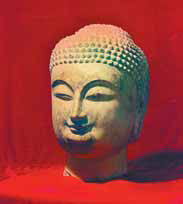|
 |
The Akshobhya Buddha's head, on the eastern wall of the Four Gates Pagoda's center pillar, was removed and stolen on the night of March 7, 1997.
"It was the most exquisite and beautiful head among the four," says Liu Jiwen, director of the Cultural Heritage Preservation Center of the Four Gates Pagoda.
In 1999, the case was cracked, but the Buddha head was still missing. The head eventually appeared at an overseas auction and was bought by disciples of Taiwan's Buddhist master Sheng Yin (1930-2009).
It was given to the Buddhist NGO Dharma Drum Mountain Foundation, which was founded by the master, and exhibited at the foundation's Museum of Buddhist History and Culture in Taipei.
In July 2002, Liu and archaeologist Liu Fengjun went to Taiwan and identified the origin of the head. On Dec 17, 2002, Master Sheng Yin escorted the head in person to give it back to the Four Gates Pagoda.
"The head is back, but there are still mysteries about these Buddha statues," says Wang Feng, deputy director of the center.
A dedication inscription on the base of the statues is dated AD 544, during the Eastern Wei Dynasty (AD 534-550), which suggests these 1.4-meter-high stone statues are 67 years older than the Sui Dynasty (AD 581-618) pagoda that houses them.
"It is not very likely the pagoda was built as a shelter after the statues were settled there," Liu says.
"It may damage the statues. Also, the pagoda was intended to keep the Buddhist relics, not the statues," Liu continues.
"But, on the other hand, to move such big stone statues into the pagoda was quite a challenge. We still cannot figure out how it was done."
Liu Fengjun has studied the characteristics of Buddha statues in other places and provided a theory that might explain the puzzle.
"The pagoda and the statues were built around the same times. The different times that the inscriptions refer to may mean something else," he explains.
By Zhang Zixuan (China Daily)





Why not rent a boyfriend, or girlfriend to please parents during the Spring Festival?